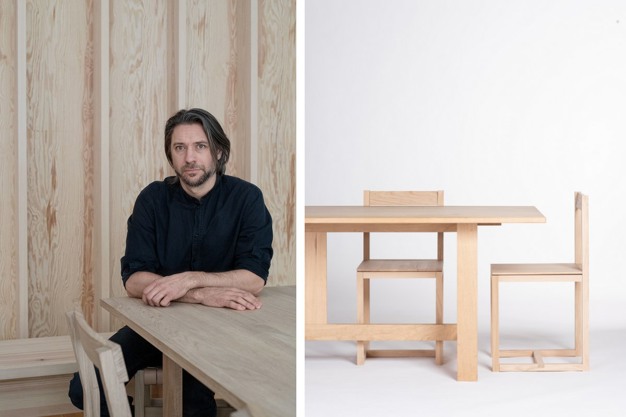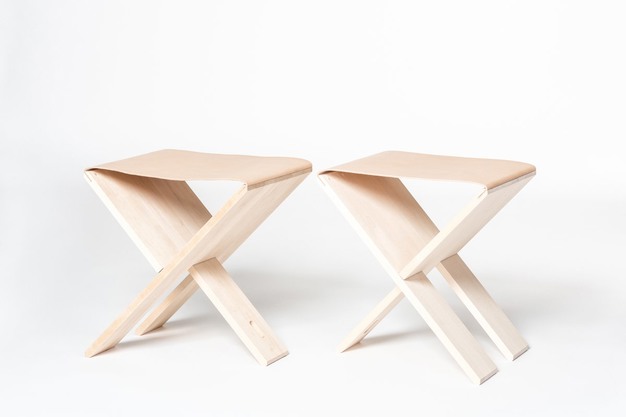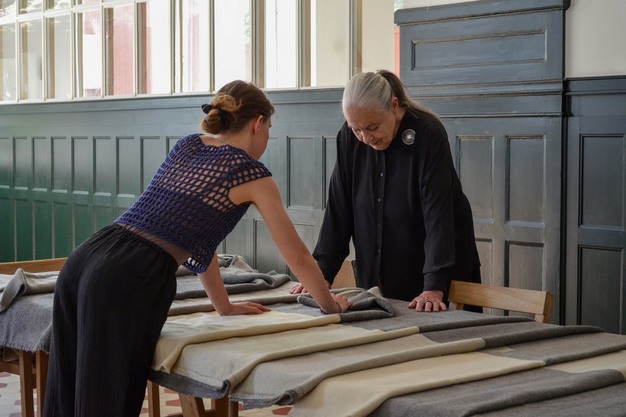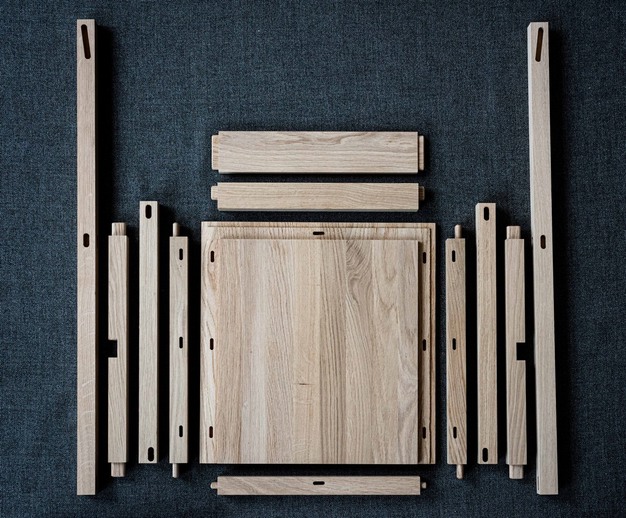The Swedish manufacturer Verk emerged from many years of conversations and discussions about how one can continue to manufacture furniture in the future. 'We want to manufacture furniture with a clear conscience in a time when new production is actually both unnecessary and stressful on the climate,' says Co-founder & Creative Director Simon Anund. We interview Simon about the company's values and their recent participation at Stockholm Furniture Fair.

Can you tell us about the history of Verk?
'We are passionate about furniture and design in general and our ambition was to produce furniture with a high level of design designed by the country's leading designers exclusively produced in Sweden exclusively from Swedish raw materials. In our opinion, it is the most sustainable way to go.
After many years in the industry, it has become clear how little is actually produced in Sweden, not to mention how few use Swedish raw materials and materials. The fact that it says Made in Sweden on a product often means that the product is assembled in Sweden, nothing more than that.
When we shared our thoughts, it became clear to us that the lion's share of the industry saw it as an impossibility to realise the idea. We felt that as an industry people rested safely in the alleged fact that it is still not possible with an all-Swedish production. With that attitude, everything can proceed exactly as usual and you can place your production where it will be most profitable, business as usual. That indication certainly proved to discourage many, but we were instead very triggered by assuming the opposite.'
Verk places a strong emphasis on sustainability and transparency in its production process. Can you elaborate on how these values are integrated into the company's philosophy and operations?
'Not only are we interested in creating furniture made from natural, sustainable materials, but we also demand that they be locally produced. Everything is traceable. The raw materials are Swedish. Every component of every piece comes from Sweden, and the factories are located within the country's borders. When we market the collection as "Made in Sweden", we want it to mean something.
Through our stance, we want to help strengthen and support the manufacturing industry that still exists in Sweden. We have the raw materials needed for furniture production – wood, steel, leather, wool, stone – but most are exported rather than used locally. Our goal is to inspire and inform about the importance of home-grown expertise and production through transparent communication, and to contribute to change.
We have since we started reached out to a large number of people dedicated to local production in various ways. The network is constantly growing and Verk is now a hub for dialogues within the field of sustainable local production in Sweden.'

Verk has expressed a commitment to constantly seeking out new Swedish raw materials and materials for its production. Can you share some insights into the company's process of sourcing and evaluating these materials?
'Besides making sustainable furniture, our work has always been about strengthening and revitalising the domestic production and processing industry. Because of this, after more than 3 years, we can now proudly present an all-Swedish furniture textile, something that has not been available for many decades.
It is a large group of actors with an enormous collective knowledge in the field of textiles who collaborated in the development of the furniture textiles that we are now launching. Ullkontoret, Sjuhäradsbyggdens Färgeri, Väveriet i Bollnäs, Rodens spinneri and Artex, They all have an important role in this project, which has been led by Rebecca Josefsson, Textile engineer from The Swedish School of Textile-University of Borås.
When we launched Verk 2021, it was said that 70% of all the Swedish sheep's wool was burnt or alternatively buried. Now, three years later, the figure has dropped to around 50%. A giant step in the right direction but still far from good. Regardless, a sign that the interest in Swedish wool is constantly growing.
Verk's perspective is always to commercialise and take advantage of the opportunities that our country offers. The challenges are of course many, but the benefits are even more.
The cost is a result of the production volume and this has previously been a problem in the domestic textile industry. Now a new chapter is being written when we once again have a large-scale wool spinning mill within the country's borders. From now on it is possible to manufacture a price competitive all-Swedish wool fabric.
It remains to be seen if the market is ready for a truly sustainable textile Made in Sweden. We have now provided the Swedish furniture industry with another sustainable alternative. Now it is up to architects, designers and producers to take the next step. Without demand, no change.'

You were recently at Stockholm Furniture Fair. What did you show there and how were the pieces received?
'This year we put most effort in promoting the new all Swedish textile. Besides the textile, we presented 2 new furniture projects.
The first one is the chair V.VP.03. Sometimes, but very rarely, it happens that some of our suppliers reaches out with ideas about how to achieve a competitive production. One such occasion was discovered this summer. KG-List is one of few large suppliers of high-quality Swedish hardwood. The company has played an important role for Verk's entire existence and today we have a close collaboration.
At KG-List they had trouble finding a sensible area of use for oak and birch in a specific dimension. Verk were asked if we would be interested in making use of that particular material. The result was a simple yet beautiful chair for cafés and restaurants as well as for the home environment. The chair is an excellent example of how important and rewarding an open dialogue between supplier and producer can be.
The chair will be available in both oak and birch with or without surface treatment. Our own black carbon black-based surface treatment gives the chair a fully matte graphic expression. The most striking thing about our new chair is the price. We are incredibly proud to be able to offer a durable, locally produced chair in solid wood at an equivalent or even lower price than our competitors' mass-produced imported products.
We also launched a new stool designed by Studio Stockholm, V.SS.01. Their folding stool, which with a simple manoeuvrer becomes a two-dimensional figure, can be easily hung on a simple wooden hook. The stool feels natural, as if it has always been there in the Verk collection. Simple and unpretentious but at the same time sober and exclusive made from the finest raw materials we have to offer in Sweden. Solid oak or birch combined with vegetable tanned leather from Tärnsjö Tannery. The production is a collaboration between KG-List and Kallfeldts Läder. The simple glue joints are sent the short distance from Norrhult to Jönköping to have the leather seat fitted and fixed using 5 wooden plugs.

The response from this year's exhibition during Stockholm furniture fair has been fantastic. We believe that it would be very difficult to reach out in that scale in any other way. We are looking forward to participating in 2025 as well.
What are the plans for Verk in the future?
'Verk aims to grow and we are expanding a lot during 2024 with several new retailers around Scandinavia and Europe. Besides that, we are constantly spreading the word about local sustainable production in as many ways possible. We are very flattered by the fact that we are invited to speak in all kinds of arenas around Europe. This spring we have lectures at Rian Design Museum in Falkenberg, at Snöhetta HQ in Oslo, for all Swedish Craft Teachers in Stockholm, and as a keynote speaker at Lithuanian Design Week in Vilnius.'
More information:
Verk
Folkungagatan 146
116 30 Stockholm, Sweden
073-526 92 10
[email protected]
www.verk.se
